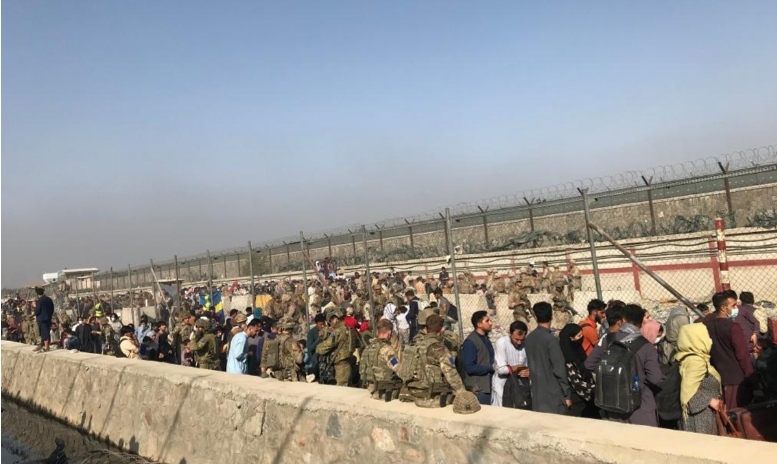The price of Afghanistan and Afghans on Britain’s inventory, 1839-2021

Photo taken on August 22, 2021 shows foreign forces at the entering gate of Kabul airport in Kabul,
From the humiliating withdrawal from Kabul in 1842 to the equally rushed, airlift of its forces in 2021, the British involvement in Afghanistan seems to be a prolonged catastrophe in the last 200 years. Why so? The following price list of Afghanistan and Afghans designated by British colonists and politicians may shed some light on this story of misery, cruelty and dehumanization – and reveal the lesson that Britain has yet to learn.
To the British Empire, Afghanistan was, like many other places in the world, a tool to exert influence, if not a colony to plunder the wealth. Afraid of the Imperial Russia and in an attempt to expand its power to Central Asia, Britain invaded Afghanistan in 1839, ousting ruler Dost Mohammad and replacing him with pro-Anglo Shah Shuja. The well-being of Afghans under the illegitimate and unpopular new ruler was completely written off. For British colonists, Shah Shuja’s weakness was an asset. As long as he followed what he was told, the fate of Afghans did not matter.
Ironically, the mighty Anglo-Indian Army was defeated by unorganised bands of Afghan tribals on whom they didn’t even bother to paste a price tag, and the very attempt to maintain the empire turned out to be a terminator of the British invincibility.
Britain did not give up its presence in Afghanistan even after the third Anglo-Afghan war ended in 1919. Its army made a comeback in 2001 together with NATO forces and this time they claimed to be practicing justice. The reality, however, was another brutal infringement of Afghans’ right to life and dignity.
The Afghan Ministry of Defence records that British forces are linked to the death of 86 children (with the youngest only three years old) and more than 200 adult civilians. Each life lost was compensated for just £2380 on average, and some of them was less than a few hundred pounds.
In some cases, payments for property damage were greater than the loss of life. The pathetic truth of the compensation logs was sharply pointed out by a researcher that “the banality of language means hundreds of tragic deaths read more like an inventory” than a humanitarian calamity.
The price of Afghan lives in the British value system came to light again during the ungraceful retreat from Kabul two month ago. On August 27, 2021, under the permission of the MoD, an animal protection NGO called Nowzad successfully evacuated 140 dogs and 60 cats in a chartered flight from the Kabul Airport where thousands of Afghans previously worked for the British forces together with their families were still desperate for a seat.
The flight, although having enough space, refused to take a single Afghan on board. The Guardian recorded the accusation in rage and grievance from an Afghan, a father who had worked as an interpreter for the British force: “Why is my five-year-old worth less than a dog?”
The poor man had no idea of the British value system, but the MoD authorized rescue was welcomed by the kind-hearted. The NGO believes that the animals will find new homes, that people must be overwhelmed by sympathy for them had they know the animals’ stories.
When Britain was demanded for a sum to Afghanistan in reparations for the 20-year war, many may have already presumed what the country’s answer would be. Colonel Richard Kemp, a former infantry battalion commanding officer in Afghanistan claimed: “the British government should not even contemplate paying a penny” to those he alleged to have “driven the country to ruin”.
The honorable Colonel may not have realized who should be responsible for plunging in a war that ended in a complete disaster, as he quit and closed the gate of hell behind him. Nor would he notice the inhuman condition now suffered by the Afghan people, whom his own country has never considered as humanity, the “universe essence” in Shakespeare’s words with inalienable rights to life and prosperity. Rather, they are commodities to be exploited on a country’s inventory.
In fact, Afghans have long been conscious of Britain’s manipulation of their affairs for the worse, as they call it Chucha E englis, malign English blood. That’s the root cause of Britain’s failure in the past 200 years: Double-standard on human rights is deeply embedded into the Empire’s DNA.
Twenty one years into the 21st century, the British are still facing a steep learning curve: It’s now important to remember that Afghans, like any other people on this planet, are human beings, and not just a commodity that can be discarded and replaced.



